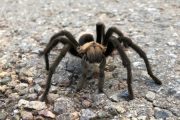That rail journey took two days. Upon arrival at Perpignan station near the border late at night, my father persuaded Robert Fortier to return home, as he had a wife and children, and was risking his life every hour he kept company with a British pilot. Robert gave him three loaves of bread to accompany the pound of mixed fat he had with him (he had grown up, as many rural poor in both England and Canada had, when nutritious food was scarce, on bread and ‘dripping,’ fat from the roasting-pan). They separated the following morning. On his way to find a crossing point to Spain, Dad broke in to what he thought was an unoccupied chateau but was agreeably surprised by the welcome accorded him by the owners he disturbed: they gave him an excellent meal, but said he had to go on his way. This he did, arriving at a vineyard near Port Vendres in which he found a hut to sleep away the daylight hours. I quote from his own account, recorded in London by M.I. 9 (Military Intelligence) on October 17, 1945, following his demobilization:
“I came out of this hut with a hoe and walked up the vineyard where I came to a footpath. I started to walk along this when two German soldiers came along. The first of these I passed but the second stopped me and asked for my papers. I tried to put him off, but he decided to search me and eventually found one of my escape maps which was sticking out of the lining of my jacket. This decided him to take me to German HQ. Here I was searched and taken to an internment camp on the way to Perpignan, where I was interrogated…[then] taken to a Luftwaffe aerodrome at Perpignan… and thence to Fresnes…” He was captured on February 8, 1944, heartbreakingly close to the Spanish border. He had been free for ten days in enemy territory.
Fresnes is the notorious prison south of Paris that was used by the occupying Germans as a holding tank for suspected French Resistance fighters and British SOE (espionage and sabotage) agents pending their executions or transfer to concentration camps, Ravensbruck and Buchenwald among them. Here the conditions were horrific: solitary confinement and torture were routine. During the liberation of Paris in late August 1944, the Gestapo murdered a large number of its prisoners. My father was in Fresnes from mid-February until April 25, 1944, by which time he had satisfied the Germans that he was who he said he was, an RAF fighter pilot. He was to be sent to Stalag Luft III, a prisoner-of-war camp for Allied airmen in the Prussian province of Silesia, at Sagan. Before he left, he was befriended by a kindly older Russian prisoner called Nikolai, whom he often recalled with affection. Neither spoke the other’s language, but they made clear to each other their mutual detestation of Nazis. Nikolai was a committed Communist, who, upon seeing a collaborators’ newspaper, pointed it out to my father with the only word they both knew: “Propaganda!” he thundered indignantly. One wonders if poor Nikolai died there, or was killed vindictively upon his return to the Soviet Union, as was the fate of so many of his fighting compatriots at war’s end, their reward from the paranoid Stalin for “allowing themselves” to fall into enemy hands…





Andrew Halpenny4 years ago
This is a wonderful, personal account of war. No remembered heroes, except to those they touched and loved. It is a very human story, and that is the essence of what we should remember of war.
Susan Leadlay2 years ago
I have just read this story, Peter, and found it very moving. It certainly paints a picture of the horrors of war, the inhumane treatment that some people can show to others, and, the complete opposite, too, the wonderful kindness and bravery of those who are prepared to help others, even in the face of the risk to themselves. I feel so strongly all that your father endured during his time of freedom, of imprisonment and during his long march. So awful.
How sad that you didn’t learn of the connection to your colleague at SRB, till it was too late. Such is life, though.